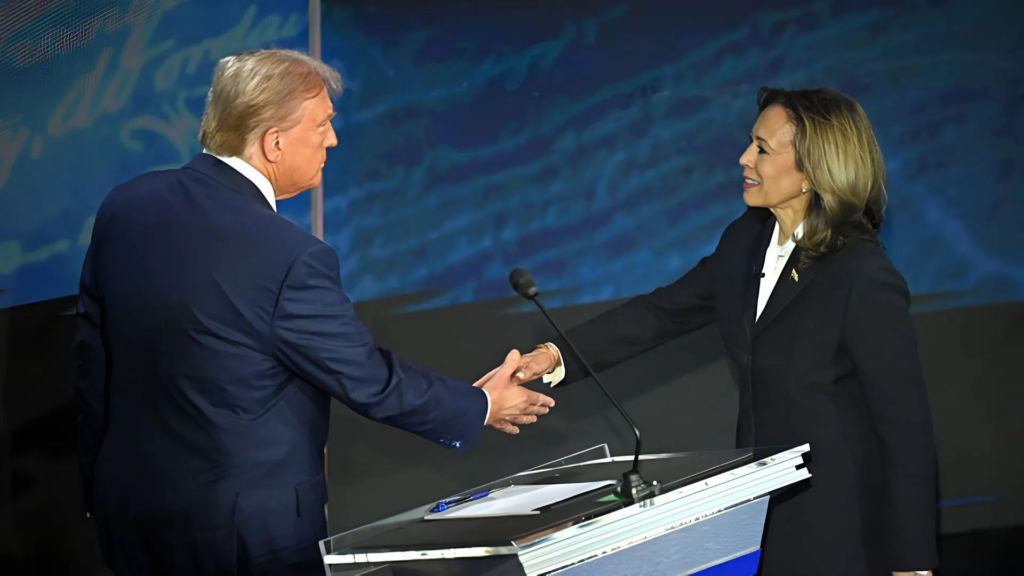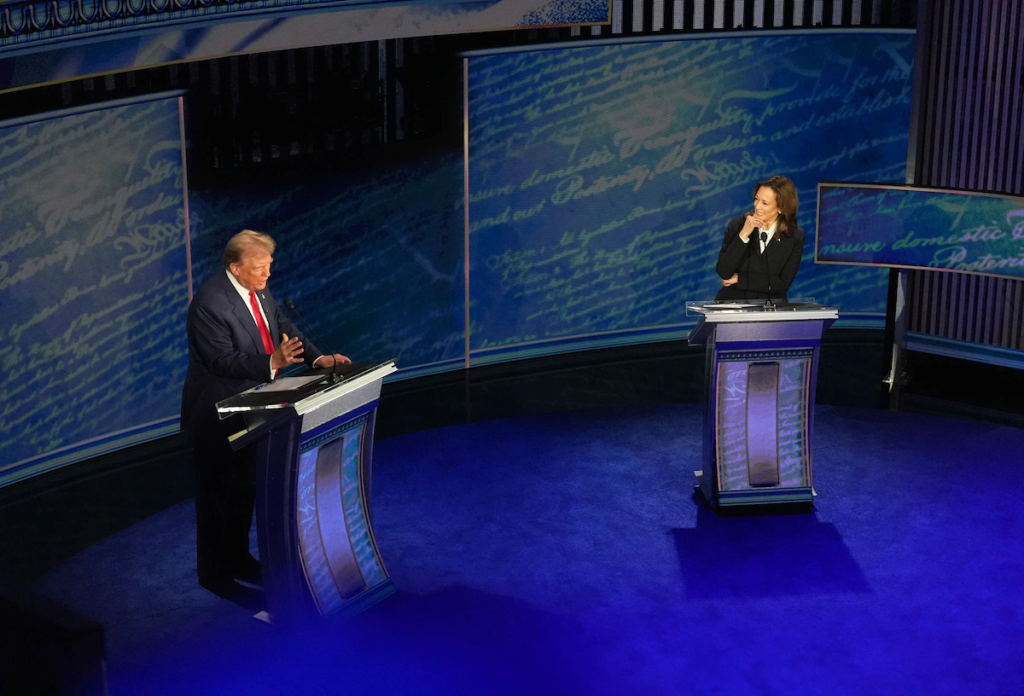Putin would eat you for lunch was a memorable and impactful statement made by Vice President Kamala Harris during the recent presidential debate with Donald Trump. This assertion encapsulates the sharp and contentious exchanges that characterized the debate, particularly concerning Russia, its leader Vladimir Putin, and the ongoing war in Ukraine.
The debate in which kamala Said, Putin would eat you for lunch was held at the National Constitution Center in Philadelphia, provided a vivid contrast between Harris’s and Trump’s foreign policy positions, illuminating the stakes involved in the upcoming 2024 presidential election.
The debate between Harris and Trump was highly anticipated, given the high stakes involved in the U.S. presidential race. Harris’s comment aimed to underscore her concerns about Trump’s potential handling of international affairs, particularly his approach to Russia and its involvement in Ukraine.
The remark Putin would eat you for lunch was made in the context of a broader discussion on the conflict in Ukraine and the U.S.’s role in supporting its ally.
Putin Would Eat You for Lunch
Vice President Harris: “Putin would eat you for lunch.” pic.twitter.com/WLAl2hJ2cw
— Republicans against Trump (@RpsAgainstTrump) September 11, 2024
During the debate, Harris challenged Trump’s foreign policy record and his approach to the Ukraine crisis. Her assertion that “Putin would eat you for lunch” was a direct critique of Trump’s perceived weaknesses in dealing with Russian aggression. Harris argued that if Trump were to return to the presidency, Putin’s aggression would go unchecked, potentially leading to further destabilization in Eastern Europe.
She suggested that Trump’s policies could have dire consequences for Ukraine, implying that Putin might have already achieved significant territorial gains if Trump had been in office.
Harris’s statement was part of a broader argument highlighting the importance of U.S. support for Ukraine and the role of NATO in countering Russian expansionism.
She defended the current administration’s stance, emphasizing that military and financial aid provided to Ukraine has been crucial in enabling the country to resist Russian advances and maintain its sovereignty. Harris pointed to the substantial aid package approved by the U.S. and its allies, which includes advanced weaponry and financial support, as evidence of the effectiveness of the current policy.
Trump’s response to Harris’s comments was assertive and defensive. He rejected the characterization of his foreign policy as weak and argued that the situation in Ukraine would have been different if he had been president.
Trump claimed that Russia would not have achieved the level of success it has in the conflict and suggested that he would have maintained a stronger stance against Russian aggression. His perspective reflects a broader isolationist approach, which involves reducing U.S. involvement in international conflicts and focusing on domestic priorities.
Trump’s Position on Ukraine and NATO
Trump’s stance on the Ukraine conflict and NATO has been a point of contention throughout his political career. In the debate, he reiterated his criticism of the U.S.’s financial commitments to Ukraine and the NATO alliance.
Trump argued that the U.S. should not bear a disproportionate share of the burden in supporting Ukraine and its European allies. He suggested that European countries, which benefit significantly from NATO’s presence, should contribute more to the alliance’s funding.
Trump’s position involves a reevaluation of the U.S.’s role in international conflicts and alliances. He has consistently advocated for reducing military expenditures abroad and focusing on negotiating deals that could quickly resolve conflicts.
Trump’s approach contrasts sharply with Harris’s defense of continued support for Ukraine and NATO. He argued that he could end the war in Ukraine within 24 hours through negotiations, although he did not provide specific details on how this would be achieved.

Harris’s Defense of U.S. Support for Ukraine
Harris’s defense of the current administration’s policy on Ukraine was a central theme of her debate performance. She emphasized the importance of U.S. support in maintaining Ukraine’s sovereignty and resisting Russian aggression.
Harris highlighted the substantial military assistance provided by the U.S., including advanced weaponry and training for Ukrainian forces. She also pointed out the significant financial support provided to help Ukraine cope with the economic and humanitarian impacts of the conflict.
Harris’s remarks were aimed at reinforcing the effectiveness of the current policy and contrasting it with Trump’s proposed approach. She argued that U.S. assistance has been crucial in enabling Ukraine to stand firm against Russian advances and maintain its independence. Harris also defended the administration’s efforts to strengthen NATO alliances and ensure that member countries are adequately supported in the face of Russian threats.
The Impact of the Debate on the Election
The debate between Kamala Harris and Donald Trump has significant implications for the 2024 presidential election. The stark contrast in their foreign policy positions highlights the broader questions facing voters about the future direction of U.S. international relations.
The clash over Russia and Ukraine underscores the importance of these issues in determining the next president’s approach to global conflicts and alliances.
The debate also reflects the broader political climate, with heightened tensions and concerns about the effectiveness of U.S. foreign policy. The exchange between Harris and Trump highlights the different visions for America’s role in the world and the potential impact on international stability.
As voters weigh their choices in the upcoming election, the implications of these differing perspectives on Russia and Ukraine will continue to be a critical factor in their decision-making process.

Reactions and Analysis
The reactions to the debate have been varied, with commentators and analysts weighing in on the significance of Harris’s and Trump’s positions.
Harris’s remark about Putin would eat you for lunch has been widely discussed as a reflection of her concerns about Trump’s foreign policy approach and its potential consequences for global stability. Trump’s defense of his record and his criticism of the current administration’s policies have also generated significant discussion and analysis.
The debate has also sparked broader discussions about the role of the U.S. in international conflicts and the effectiveness of its alliances. Harris’s defense of NATO and U.S. support for Ukraine contrasts with Trump’s calls for a reevaluation of the U.S.’s involvement in global affairs. This divergence reflects deeper political divides and differing perspectives on how best to address international challenges.
The debate between Kamala Harris and Donald Trump has provided a vivid illustration of the contrasting foreign policy visions at stake in the 2024 presidential election. Harris’s comment that “Putin would eat you for lunch” highlights the critical issues facing voters as they consider the future direction of U.S. international relations.
The clash over Russia and Ukraine underscores the importance of these issues in shaping the next president’s approach to global conflicts and alliances.
As the election approaches, the debate between Harris and Trump will continue to be a focal point of discussion and scrutiny. The implications of their differing perspectives on Russia, Ukraine, and international alliances will play a significant role in determining the next president’s approach to foreign policy and global stability. Voters will need to carefully consider these factors as they make their decisions in the upcoming election.

